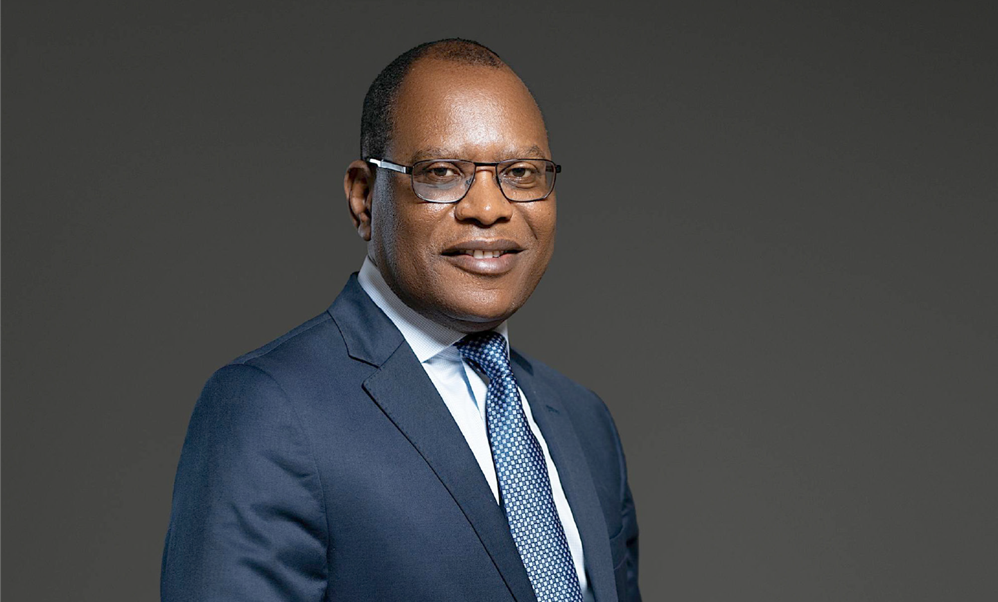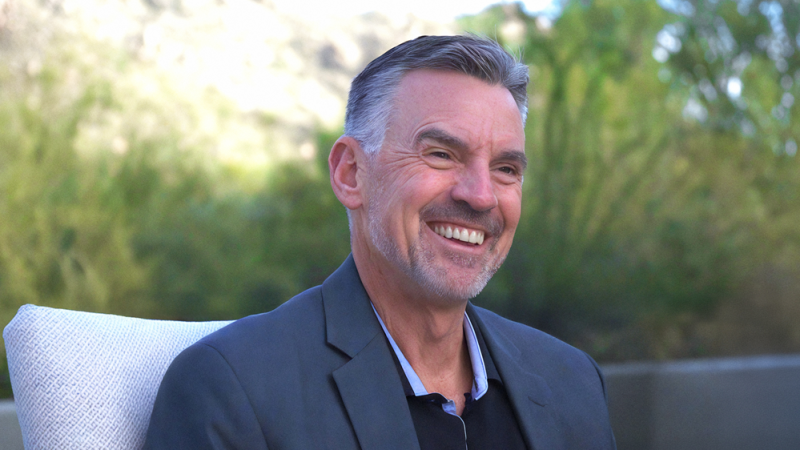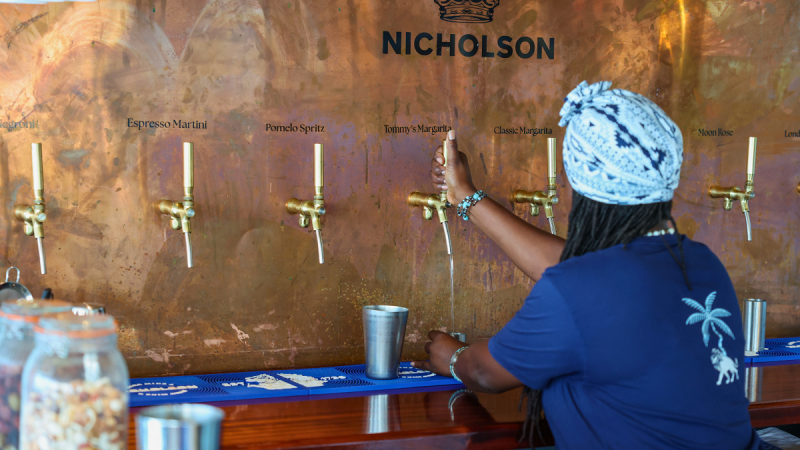Zambia Sugar began life with a modest business proposition. It was established in 1964 to supply sugar to local markets, and to export to the UK and Europe. This was six decades ago. Those six decades have seen Zambia Sugar undergo tremendous growth, becoming the biggest sugar company in Zambia, with the biggest factory of any kind in the country. More than that, it runs the largest single-site cane sugar factory on the entire African continent.
“It is quite an achievement from our humble beginnings,” reflects Oswald Magwenzi, CEO of Zambia Sugar. “Last year we celebrated our 60th anniversary, and when a company has existed for 60 years, I think you have demonstrated you have a sustainable business model!”
It is a journey that has seen the company receive no small amount of recognition, including being listed on the Lusaka Securities Exchange.
“That was a significant milestone,” Magwenzi says. “We are one of the biggest agricultural businesses on the stock exchange. Over the years we have changed from private ownership, to public ownership, to private again, and currently we are owned by Associated British Foods and local shareholders.”
Associated British Foods owns 75% of Zambia Sugar, which operates under the Group’s sugar division, while the other 25% of its shares are owned by local and international shareholders. The company produces its own cane from 16,000 hectares of farmland, as well as sourcing it from another 14,000 hectares of land owned by local growers. As well as those growers, Zambia Sugar also provides work to over 7,000 people who the company employs directly.
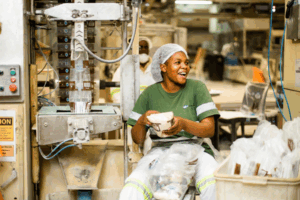
The sugar supplier has managed to achieve this level of size and market position thanks to its unique commercial and financial capabilities. The firm is home to the widely known Whitespoon Sugar brand, recognised across Zambia and beyond.
“We are the market leader in the country with a market share of 80% supported by a nationwide distribution network,” Magwenzi explains. “You can access our sugar from every corner of Zambia, which is a capability appreciated by customers and consumers alike. No matter how much sugar we produce, if it is not available for people that does not help very much. We pride ourselves on that nationwide delivery capability. Those are the commercial fundamentals, a strong brand, a reliable distribution network and finally, we have an unrivalled product portfolio.”
Product range might not be something you expect from a company built around the production and sale of a single product, but when it comes to sugar, quantity matters. A person buying sugar to put in their tea at home requires sugar in different volumes than an industrial food manufacturer.
“Not many of our competitors have the range we do. We have sugar in one ton bags, 10 kilogram bags, 50 kilograms, 2 kilograms, 1 kilogram, 500 gram, all the way to 70 gram bags,” Magwenzi tells us. “As a result, we can service all consumer segments, from industrial to middle income, upper income and low income consumers. You will be hard-pressed to find a competitor that matches our commercial capabilities.”
An Unrivalled Production
Every size of sugar packet is produced by Zambia Sugar’s immense production facilities. The company truly stands alone in terms of scale, with a production facility that offers 450,000 tonnes per annum of capacity. Indeed, the main limiting factor Zambia Sugar faces is the amount of raw sugar cane available, which currently limits production to only 400,000 tons of sugar. However, Magwenzi tells us the company is seeking out other avenues of supply, to embrace the opportunity to increase production without the need for further investment.
“We do not really have any competitors who can meet this kind of opportunity like we are able to do,” Magwenzi says. “When we look at sugar cane production in southern Africa there are not many companies producing as we do. We consistently reach levels of 3 million tons of sugar cane, even in drought years.”
The ability to reliably produce 400,000 tonnes of sugar and 3 million tons of cane opens up economies of scale to Zambia Sugar that its competitors simply do not have access to. But beyond that, Zambia Sugar is also able to make that production profitable, regularly paying dividends to shareholders as the price of the shares themselves have grown 14 times.
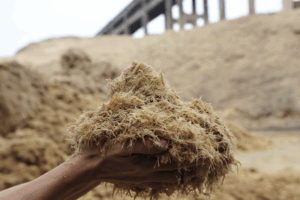
“That sets us apart. We have strong commercial fundamentals, strong production fundamentals and the financial performance to satisfy the expectations of our shareholders,” Magwenzi explains.
This achievement is all the more impressive given the challenges Zambia Sugar has recently overcome. When we speak with Magwenzi, the firm is still fresh from the worst drought in Zambia’s history.
“We have been able to navigate that challenge by leveraging the good relationships we have with key stakeholders such as electricity utilities who can import power for us,” he says. “We are also leveraging our relationships with the Ministry of Agriculture and the Ministry of Water Development and Sanitation to continue to be allowed to extract water from the Kafue River to sustain our crops.”
Typically, drought years are years when an agricultural company would not expect to meet their production objectives, but Zambia Sugar has met and exceeded its target of 3 million tons of sugar cane by being proactive and resilient in the face of a potentially catastrophic situation. It is resilience that Zambia Sugar will have to continue to rely on in the future.
“We will continue to have climate change challenges. We will see water levels dropping and power shortages, we are responding to that with investments in modern irrigation systems to produce cane with less water, energy and labour,” Magwenzi says. “We have laid out a significant investment plan to develop our own power generation through our factory. Those are just some of the challenges we have faced and will continue to adapt to in the coming years.”
The Foundation of the Business
If that vital resilience is to be found anywhere in Zambia Sugar, it is in its 7,000 employees, and Magwenzi is the first to stress their importance.
“People are the foundation of everything we do. You can have great resources, facilities and opportunities, but without hardworking, motivated people you will not achieve your objectives,” Magwenzi shares. “We have a strong people agenda. Our stated goal is to create a safe and great place for people to work. That is what attracts people to Zambia Sugar in the first place.”
Zambia Sugar’s workforce is a vast and carefully maintained operation, including several different categories of workers, from management and leadership to permanent staff to seasonal workers.
“We have managers in training, and we have people that work for us on a contract basis,” says Magwenzi. “We advertise internally, externally, and through the various media channels including online and printed media. Everyone has an opportunity to join Zambia Sugar.”
To retain that workforce, Zambia Sugar has established itself as an employer of choice. The business offers a unique workplace, outside the urban environment, 130 kilometres from Lusaka.
“For some people that might be considered a disadvantage, we regard it as a strength,” says Magwenzi. “We attract people that enjoy an outdoor lifestyle, which means we have never really struggled to find people.”
Zambia Sugar provides housing for its people, as well as a vehicle scheme and other benefits that mean people choose to stay with the company for many years. Indeed, Magwenzi says that the firm has one of the lowest turnovers in the country.

“We have been able to retain people as a result of our location and what we offer,” Magwenzi says. “They see us as a company that’s going somewhere, with a historic track record behind us.”
To make sure its staff go with it on that journey, the company has a Learning and Development Department dedicated to continuously investing in the skills of its people.
“We look after their career and help them realise their plans, undertaking conversations with our people to support their personal development and chart each individual’s path,” Magwenzi states. “We give people opportunities to work across many parts of our operations. Zambia Sugar grows cane, processes it and distributes it, so our people have opportunities to work in every part of the value chain.”
That continuous improvement approach can be seen in every part of the company, all the way up to the management and leadership development program it carries out at its top levels. These programs are carried out in collaboration with Zambia Sugar’s parent company, as well as with the University of Pretoria’s Gordon Institute for Business Science (GIBS).
Sweet Possibility
With the company’s continuing work to improve every aspect of the business, Magwenzi predicts a bright future for the firm.
“We are in the food business, and unless we invent a new human being, food has no substitutes,” Magwenzi points out. “You have to continue to eat one way or another, so we have a growing market. That includes a growing export market, as not many countries have the production fundamentals we do for sugar cane and sugar.”
To meet that demand, Zambia Sugar continues investing significantly in its capability to serve an expanding market, including the launch of a 1.7 billion kwacha investment in a new packing plant and modern warehouse facility.
“This will allow us to ensure all of our sugar is stored in food-safe conditions while enhancing our ability to respond to the market,” Magwenzi says. “We are also looking to diversify our revenue streams. We are looking at an opportunity to produce electricity and sell it to the grid.”
Currently, Zambia Sugar produces 40 megawatts of electricity, with plans to increase that to 100 megawatts and sell to other users across Zambia, but that is not all.
“We are the only producer of refined sugar in the country with a 90,000 ton refinery,” Magwenzi tells us. “It is used mainly by industrial customers, and with growing industrialisation, the future for supplying refined sugar has great potential. We are ready to fully take advantage of those opportunities.”
In our conversation with Magwenzi, his plans for the future of the company come across strongly.
“Our vision is to be the best at serving our customers while taking advantage of the tremendous opportunities available to us,” he says. “We have a parent company with deep pockets to support our plans for the future and operate in a stable country that will allow us to do all the things we plan. We are very excited.”
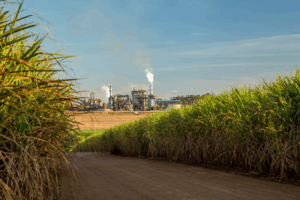
But as excited as Magwenzi is for the future, he remains aware that he is building on the foundation of Zambia Sugar’s 60 years of history.
“We invited the President to be our guest of honour, and he officiated our 60th anniversary celebration alongside many of our stakeholders,” Magwenzi says. “It is a real moment of pride to reach that 60 year landmark. We have seen many companies that do not get anywhere near that. We know many that started with us and are no longer here, and having the President come and grace our celebration made it even more special.”
At the celebration event President Hakainde Hichilema spoke about Zambia Sugar’s sustainable grower business model, praising it as a good example of how a multinational can create an inclusive supply chain that benefits itself and local players.
“It was really a moment to remember, and to launch our plans for the future” Magwenzi says. “We want to be around for the next 60 years.”
Magwenzi concludes by pointing out that those plans are not just plans for the business itself, but for the significant role that Zambia Sugar plays in the communities in which it operates as a responsible corporate citizen.
“We support malaria programs and several other community programs,” he says. “We pride ourselves on being a company that is a good neighbour wherever we are. We do our very best to make a contribution beyond just making sugar.”
